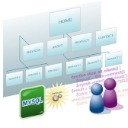Details, Details, Details – It’s all in the Details
Friday, October 5th, 2012
Today I was trying to get some work done (from home!) and I got a chat from one of the Data Sci guys I work with in Palo Alto. He was saying that he couldn't find the data I'd just generated into CouchDB. Because Couch is a NoSQL database, we needed to enforce some kind of structure to the documents, and what we chose was the idea of an execution tag. Currently, it's the date and time of the run - to the millisecond, and the name of the division it's running. This is calculated once at the start of the run and then used in all logging and persistence stores so that it's easy to correlate all the data for a given run.
But today, it seems, the execution tag wasn't constant after all. That's a big problem.
So I started to track this down, and I very quickly came to the realization that the massive refactoring that a co-worker had done to try and streamline logging in the application really wasn't preserving the essential nature of the execution tag. It was generating several of them - all a few seconds off.
Now, don't get me started on the need for logging. It's what I think of as essential to serious, commercial, production apps. You just gotta have it. But there seems to be a group of folks that wants to get back to the APL days where there's no logging, no comments, and the strong belief that the code speaks for itself.
I can't possibly disagree more with all these points, but that's another day, as I said. But not respecting a critical thing like the immutability of the primary correlation factor in the data is kind of a big deal. But it's really a detail, isn't it?
The tests all passed - and the code ran, so it's got to be good, right?
Unfortunately, that's far too often the case with a lot of the younger developers I'm meeting these days. Nice guys, and they are capable of writing good code, but I think they just don't want to put forth the effort it takes to pay attention to all the details. After all, there are a lot of them in even the most simplistic of business apps.
I've talked to a lot of younger coders, and they are self-confessed "Lazy coders". Now I know they aren't really lazy, they work hard, but they aren't interested in paying attention to the details, and that's where everything of importance is to be found.
I just wish I could teach them of the need, but I think the only one that can teach them that, is Time. She has a funny way of catching up to even the smartest of folks.





